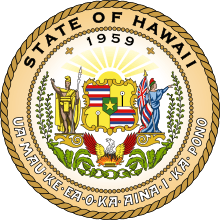Flag of Hawaii
The flag of Hawaii (Hawaiian: Ka Hae Hawaiʻi) has previously been used by the kingdom, protectorate, republic, and territory of Hawaii. It is the only US state flag to include a foreign country's national flag. The inclusion of the Union Jack of the United Kingdom is a mark of the British Empire's historical relations with the Hawaiian Kingdom, particularly with King Kamehameha I.[1][2] The flag continued to be used after the 1893 overthrow of the Hawaiian Kingdom.
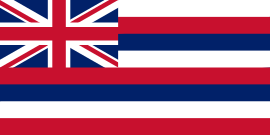 | |
| Name | Ka Hae Hawaiʻi |
|---|---|
| Use | Civil and state flag |
| Proportion | 1:2 |
| Adopted | December 29, 1845 (last modified in 1898) |
| Design | Eight alternating horizontal stripes of white, red, and blue, with the United Kingdom's Union Flag in the canton |
Origins
.svg.png)
While many older Native Hawaiians, prior to 1921, had erroneously believed the current flag of Hawaii was created by Captain Alexander Adams during his trip to China in 1817 aboard the Kaahumanu, there is no indication that the flag was either made or flown during that period. Adams noted that in 1817 on his way to China he raised his own ensign on Kauai in lieu of a Russian flag as the king had no other. Adams's journals also mention the British East India Company flag. Kamehameha had wanted to purchase a brig named the Forester out of London. As part of transfer, the flag, which consisted of the Union Jack on a field of red-and-white stripes, was taken by Adams during a ceremony with an 11-gun salute.[3]
In 1793, Captain George Vancouver, having previously visited the islands with Captain James Cook, returned in command of HMS Discovery.[4] During the visit, Vancouver met with Kamehameha I and presented him with a Red Ensign,[5] used by the Royal Navy at the time. The Kingdom of Ireland was not a formal part of the United Kingdom before 1801, which meant that, at this time, the British flag did not contain the Saint Patrick's Cross of Ireland. This version of the Red Ensign, as well as the current version which added the cross in 1801, was the unofficial flag of the Kingdom of Hawaii until 1816.[6]
.svg.png)
.svg.png)
An adviser to Kamehameha noted that the Union Flag could draw Hawaii into international conflict, as his kingdom could be seen as an ally of the United Kingdom, and he subsequently lowered the Union Flag over his home at Kamakahonu. While disputed as to its historical accuracy, one account stated that in order to placate US interests during the War of 1812, a US flag was raised over Kamehameha's home, only to be removed when UK officers in the court of Kamehameha vehemently objected to it. This would explain why the resulting flag of Hawaii was a deliberate hybrid of the two nations' flags.[7]
In 1816, Kamehameha commissioned his own flag to avoid this conflict, which has evolved into the current flag. It was probably designed by one of the commanders of the Royal Hawaiian Navy (which consisted of HHMS Kaimiloa), former officers of the British Royal Navy, who advised Kamehameha, based on a form of the British naval flag. There is debate as to the actual designer: some credit Alexander Adams, others George Charles Beckley. It was very similar to the flag of the British East India Company in use at about this time, which had only red and white stripes. Captain Adams used this flag for the first time on a Hawaiian trade mission to China in 1817.[8]
There may have been different versions of the flag with different numbers of stripes and colors.[9] The number of stripes also changed: originally, the flag was designed with either seven or nine horizontal stripes, and in 1845 it was officially changed to eight stripes. The latter arrangement is used today.[7]
Design
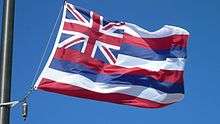
The canton of the flag of Hawaii contains the Union Flag of the United Kingdom, prominent over the top quarter closest to the flag mast. The field of the flag is composed of eight horizontal stripes, symbolizing the eight major islands (Hawaiʻi, Maui, Kahoʻolawe, Lānaʻi, Molokaʻi, Oʻahu, Kauaʻi, and Niʻihau). Other versions of the flag have only seven stripes, probably representing the islands with the exception of Kahoʻolawe or Niʻihau. The color of the stripes, from the top down, follows the sequence: white, red, blue, white, red, blue, white, red. The colors were standardized in 1843, although other combinations have been seen and are occasionally still used.[10][11]
In 2001, a survey conducted by the North American Vexillological Association (NAVA) placed Hawaii's flag 11th in design quality out of the 72 Canadian provincial, US state and US territorial flags ranked.[12]
Lā Hae Hawaiʻi
In 1990, Governor of Hawaii John Waihee proclaimed July 31 to be Lā Hae Hawaiʻi, the Hawaiian Flag Day. It has been celebrated each year since then.[13] It is the same date as Lā Hoʻihoʻi Ea, Sovereignty Restoration Day, a holiday of the Kingdom of Hawaiʻi that is celebrated by proponents of the Hawaiian sovereignty movement.[14]
Flag of the Governor
The flag used by the governor of Hawaii is a red and blue bi-color. In the middle of the eight white stars appears the name of the state in all capital letters. During the time Hawaii was a United States territory, the letters in the middle of the flag were "TH", which stood for "Territory of Hawaii".[15]
 Standard of the governor before statehood in 1959
Standard of the governor before statehood in 1959 Standard of the governor of Hawaiʻi
Standard of the governor of Hawaiʻi
Chronology
Date Flag Image 1793–1800 British Red Ensign[16] .svg.png)
1801–1816 British Red Ensign following the Acts of Union with Ireland 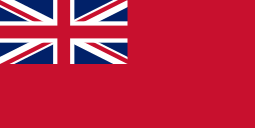
1816–1843 Early version of the present flag .svg.png)
February 1843 – July 1843 Union Flag (during the Paulet Affair) 
July 1843 – May 1845 Early version of the present flag .svg.png)
December 1845 – February 1893 The current Hawaiian flag introduced in 1845 .svg.png)
February 1893 – April 1893 US flag (after the overthrow of the Kingdom of Hawaii) .svg.png)
1894–1898 Hawaiian flag re-adopted by the Republic of Hawaii .svg.png)
1898–1959 Hawaiian flag used by the US territory of Hawaii 
1959–present Hawaiian flag currently used by the State of Hawaii 
Gallery
 Personal Standard of the King Kalakaua
Personal Standard of the King Kalakaua.svg.png) Personal Standard of Princess Kaiulani
Personal Standard of Princess Kaiulani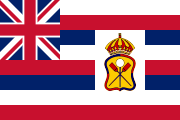 Naval Ensign of the Kingdom of Hawaii, with the only existence of this flag being on the Kaimiloa
Naval Ensign of the Kingdom of Hawaii, with the only existence of this flag being on the Kaimiloa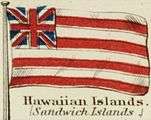 1868 flag chart
1868 flag chart%2C_Hawaiian_cotton_quilt_from_Waimea%2C_before_1918%2C_Honolulu_Academy_of_Arts.jpg) Hawaiian quilt from Waimea, before 1918
Hawaiian quilt from Waimea, before 1918
See also
References
- Marshall, Tim (2017). A Flag Worth Dying For: The Power and Politics of National Symbols. Simon and Schuster. pp. 52–53. ISBN 9781501168338.
- Bloss, Janet Adele (1983). State Flags. Willowisp Press. p. 66. ISBN 9780874061833.
- The Friend. 1921. p. 43.
- MARK "KAILANA" NELSON (March 4, 2011). Learn to Play Hawaiian Slack Key Guitar. Mel Bay Publications. p. 9. ISBN 978-1-61065-596-5.
- All about Hawaii: The Recognized Book of Authentic Information on Hawaii, Combined with Thrum's Hawaiian Annual and Standard Guide. Honolulu Star-Bulletin. 1974.
- Donald T. Healy; Peter J. Orenski (January 12, 2016). Native American Flags. University of Oklahoma Press. p. 279. ISBN 978-0-8061-5575-3.
- Quaife, Milo; M. J. Weig; R. E. Appleman (1961). The History of the United States Flag. New York: Harper. p. 154.
- Henry Whalley Nicholson (1889). From sword to share: or a fortune in five years at Hawaii. W.H. Allen & Co. pp. 83–85.
- Howard M. Ballou (1906). The Reversal of the Hawaiian Flag. pp. 5–11. ISBN 0-8028-5088-X.
- "Name and Insignia of Hawaii – State Flag". Hawaii State Library. March 1, 2006. Archived from the original on May 11, 2007. Retrieved October 25, 2007.
- BBC History, Jan 2008
- "2001 State/Provincial Flag Survey" (PDF). nava.org.
- "Ka Hae Hawai'i - The Hawaiian Flag". Hawaii Public Radio. Retrieved July 29, 2020.
- Hoʻokahua Staff (July 2014). "Lā Hoʻihoʻi Ea: Hawaiʻi Commemorates Sovereignty Restoration Day". Kaleinamanu Hawaiian Cultural Center, Kamehameha Schools. Retrieved September 3, 2011.
- "Name and Insignia of Hawaii – Governor's Flag". Hawaii State Library. March 1, 2006. Archived from the original on May 11, 2007. Retrieved October 25, 2007.
- All about Hawaii: The Recognized Book of Authentic Information on Hawaii, Combined with Thrum's Hawaiian Annual and Standard Guide. Honolulu Star-Bulletin. 1974.
External links
| Wikimedia Commons has media related to Flags of Hawaii. |
